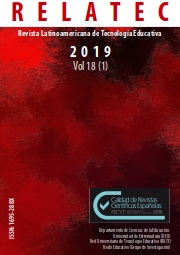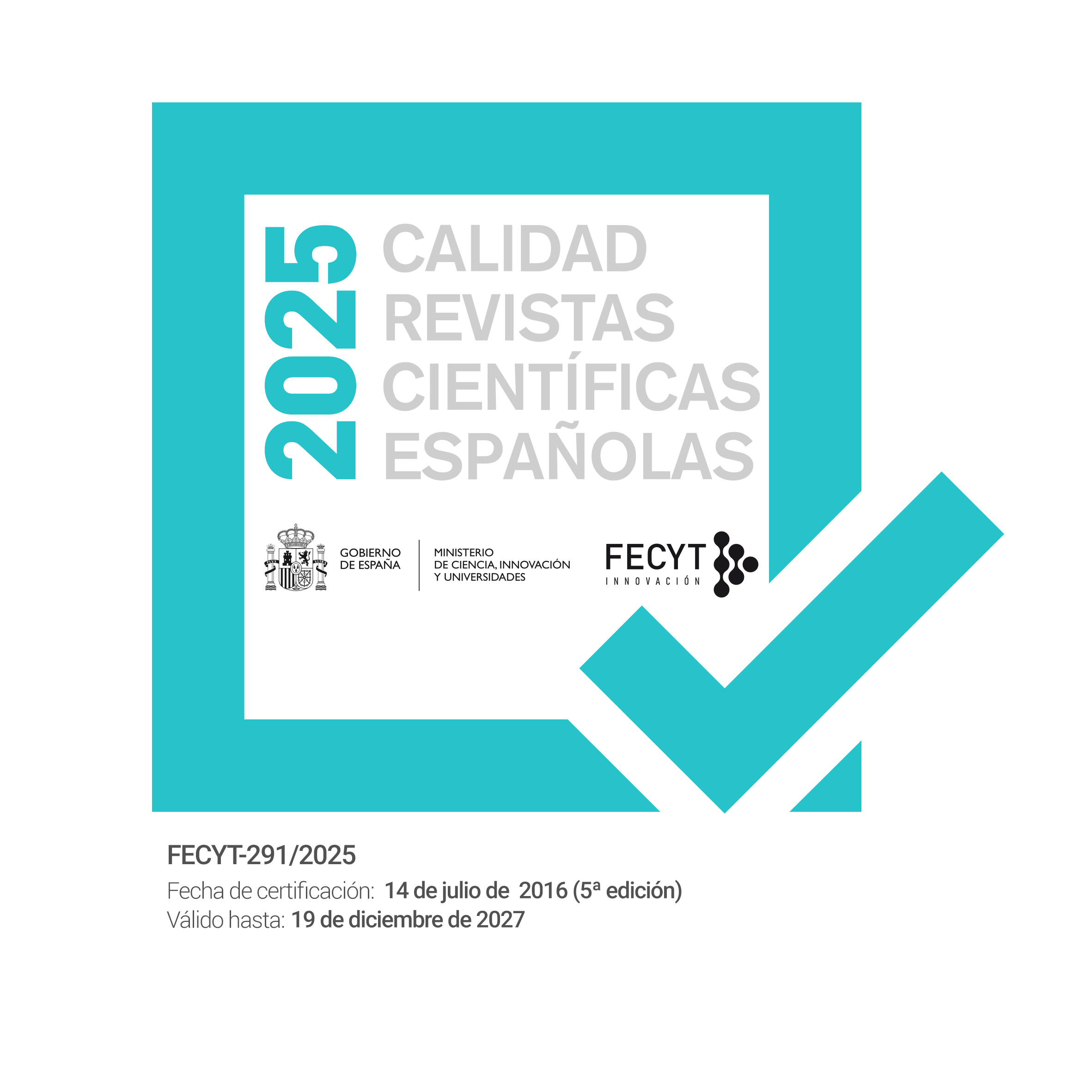Strategies for the management of digital competences in higher education: a review in the literature
DOI:
https://doi.org/10.17398/1695-288X.18.1.71Keywords:
Digital Literacy, Digital Competence, Higher Education, DigComp, Information Technology CommunicationAbstract
This study on strategies for the management of digital competences used by higher education institutions is of great relevance since, with the ubiquity of ICTs, it becomes necessary to encourage the use of critical, ethical and creative use of digital resources and tools, integrating new actions into the educational context. Thus, the article aims to identify which teaching and learning strategies higher education institutions are performing for student qualification in digital skills. In order to collect data, the study was carried out in two stages, the first one referring to exploratory searches, to identify models of digital skills, emphasizing the European Digital Competence Framework for Citizens DigComp 2.0. In a second moment, the carrying out of searches in a systematic way, to identify teaching and learning strategies. From the qualitative analysis between the similarities of the strategies identified, and the digital competences, it is possible to cross-cut these data, classifying the actions carried out by the academic centers, according to the five areas evidenced in the European Framework. In this bias, the study demonstrated that the actions taken by higher education institutions do not serve the areas of digital content creation and security, recommending new academic practices to overcome this gap.
Downloads
References
Adams Becker, S., Cummins, M., Davis, A., Freeman, A., Hall Giesinger, C., & Ananthanarayanan, V. (2017). Horizon Report 2017 Higher Education Edition. Austin, Texas: The New Media Consortium. Recuperado de http://cdn.nmc.org/media/2017-nmc-horizon-report-he-EN.pdf
Carretero, S.; Vuorikari, R., & Punie, Y. (2017). DigComp 2.1: The Digital Competence Framework for Citizens with eight proficiency levels and examples of use. EUR 28558 EN, doi:10.2760/38842.
Castellanos, A., Sánchez, C. y Calderero, J. F.(2017). Nuevos modelos tecnopedagógicos. Competencia digital de los alumnos universitarios. Revista Electrónica de Investigación Educativa, 19(1), 1-9.Recuperado de http://redie.uabc.mx/redie/article/view/1148
Cinque, M., & Bortoluzzi, M. (2013). Navigating complex challenges: Digital competence and personal knowledge management in university education to foster skills for lifelong learning. International Journal of Technology Enhanced Learning, 5(3-4), 284-298. doi:10.1504/IJTEL.2013.059496
Coldwell-Neilson, J. (2017). Assumed digital literacy knowledge by Australian universities: Are students informed? Paper presented at the 19th Australasian Computing Education Conference, ACE 2017.
Durán, M. C., Prendes, M.P.E. y Guriérrez, I. P. (2019). Certificación de la Competencia Digital Docente: propuesta para el profesorado universitario. RIED. Revista Iberoamericana de Educación a Distancia, 22(1), pp. 187-205.doi: http://dx.doi.org/10.5944/ried.22.1.22069
Educase (2019). Horizon Report Preview 2019 Higher Education. Recuperado de: https://library.educause.edu/-/media/files/library/2019/2/2019horizonreportpreview.pdf.
Epure, M., & Mihaes, L. C. (2015). Adapting Teaching And Learning To The Labour Market Requirements - A Romanian Case Study. In L. GomezChova, A. LopezMartinez, & I. CandelTorres (Eds.), Edulearn15: 7th International Conference on Education and New Learning Technologies (pp. 2911-2919). Valenica: Iated-Int Assoc Technology Education a& Development.
European e-Competence Framework - E-CF. (2016). Eupean e-Competence Framwork. The what, how and why guide to the e-CF. Recuperado de http://www.ecompetences.eu/e-cf-overview
European Comission. (2017). Being digitally competent – a task for the 21st century citizen. Recuperado de https://ec.europa.eu/jrc/en/digcomp
Ferrari, A. (2012). Digital competence in practice: an analysis of frameworks. Sevilha: JRC-IPTS.
Ferenhof, H. A., & Fernandes, R. F. (2016). Desmistificando a revisão de literatura como base para redação científica: método SSF. Revista Acb: Biblioteconomia em Santa Catarina, Florianópolis, 21 (3) .550-563.
Fleacă, E. (2017). Entrepreneurial curriculum through digital-age learning in higher education - A process-based model. TEM Journal, 6(3), 591-598. doi:10.18421/TEM63-22
Freire, P. (2013). Aumente qualidade e quantidade de suas publicações científicas: Manual para elaboração de projetos e artigos científicos. 1. ed. - Curitiba, PR: CRV.
González Calatayud, V., Román García, M., & Prendes Espinosa, M.P. (2018). Formación en competencias digitales para estudiantes universitarios basada en el modelo DigComp.Edutec. Revista Electrónica de Tecnología Educativa, 65, 1-15.doi:https://doi.org/10.21556/ edutec.2018.65.1119
Kuhn, C. (2017). Are Students Ready to (re)-Design their Personal Learning Environment? The Case of the E-Dynamic. Space. Journal of New Approaches in Educational Research, 6(1), 11-19. doi:10.7821/naer.2017.1.185
Liesa Orus, M., Vazquez Toledo, S., & Lloret Gazo, J. (2016). Identifying the strengths and weaknesses of the digital competency in the use of Internet applications in first grade of the Teacher Degree. Revista Complutense De Educacion, 27(2), 845-862. doi:10.5209/rev_RCED.2016.v27.n2.48409
Martín, A. M. V., Cazco, G. H. O., González, M. C., & Abad, F. M. (2016). Digital competence of the University faculty: Case study of the Universidad nacional de Chimborazo. Paper presented at the 4th International Conference on Technological Ecosystem for Enhancing Multiculturality, TEEM 2016.
Martín Rodríguez, Déborah; Sáenz de Jubera, Mª Magdalena; Santiago Campión, Raúl; Chocarro de Luis, Edurne (2016). Diseño de un instrumento para evaluación diagnóstica de la competencia digital docente: formación flipped classroom. En Revista Didáctica, Innovación y Multimedia, núm. 33.http://dim.pangea.org/revista33.htm
Mengual-Andres, S., Roig-Vila, R., & Mira, J. B. (2016). Delphi study for the design and validation of a questionnaire about digital competences in higher education. International Journal of Educational Technology in Higher Education, 13, 11. doi:10.1186/s41239-016-0009-y
Montoro, M. A., Hinojo-Lucena, F. J., & Sánchez, F. R. (2015). A study on ICT training among faculty members of spanish faculties of education. New Educational Review, 42(4), 27-39. doi:10.15804/tner.2015.42.4.02
Organização das Nações Unidas para a Educação, a Ciência e a Cultura - Unesco. (2013). Global Media and Information Literacy Assessment Framework: Country Readiness and Competencies. Recuperado de http://unesdoc.unesco.org/images/0022/002246/224655e.pdf. Acesso em 29 de out.de 2017
Pereira, N.L. (2019). Boas práticas no uso de ambientes virtuais de ensino e de aprendizagem para mediação da estruturação de trabalhos de acadêmicos. 2019. 198 f. Dissertação (Mestrado) - Curso de Pós Graduação em Tecnologias da Informação e Comunicação, Universidade Federal de Santa Catarina, Araranguá.
Pérez-Escoda, A., & Rodríguez-Conde, M. J. (2015). Digital literacy and digital competences in the educational evaluation: USA and IEA contexts. Paper presented at the 3rd International Conference on Technological Ecosystems for Enhancing Multiculturality, TEEM 2015.
Pérez-Mateo, M., Romero, M., & Romeu-Fontanillas, T. (2014). Collaborative construction of a project as a methodology for acquiring digital competences. Comunicar, 21(42), 15-23. doi:10.3916/C42-2014-01
Prendes Espinosa, M.P., Martínez Sánchez, F. y Gutiérrez Porlán, I.( 2017). Competencia digital: Una necesidad del profesorado universitario en el siglo XXI. RED Revista de Educación a Distancia, 56. Recuperado de : http://www.um.es/ead/red/56/prendes_et_al.pdf
Prendes Espinosa, M.P., Solano Fernández, I. M., Serrano Sánchez, J. L., González Calatayud, V. & Román García, M.M. (2018). Entornos Personales de Aprendizaje para la comprensión y desarrollo de la Competencia Digital: análisis de los estudiantes universitarios en España. Educatio Siglo XXI, [s.l.], v. 36, n. 2, p.115-134. Servicio de Publicaciones de la Universidad de Murcia. http://dx.doi.org/10.6018/j/333081
Roushan, G., Holley, D., & Biggins, D. (2016). The kaleidoscope of voices: An action research approach to informing institutional e-learning policy. Electronic Journal of e-Learning, 14(5), 293-300.
Takeuchi, H., & Nonaka, I. (2008). Gestão do Conhecimento. Porto Alegre: Bookman.
Tømte, C., Enochsson, A. B., Buskqvist, U., & Kårstein, A. (2015). Educating online student teachers to master professional digital competence: The TPACK-framework goes online. Computers and Education, 84, 26-35. doi:10.1016/j.compedu.2015.01.005
Urena Torres, J. P., Tenesaca Luna, G. A., Arciniegas, M. B. M., & Segarra Faggioni, V. (2017). Collaborative and active learning through web 2.0 tools applied in higher education. Paper presented at the 12th Iberian Conference on Information Systems and Technologies, CISTI 2017.
Vuorikari, R., Punie, Y., Carretero Gomez S., & Van Den Brande, G. (2016). DigComp 2.0: The Digital Competence Framework for Citizens. Update Phase 1: The Conceptual Reference Model. Luxembourg Publication Office of the European Union. EUR 27948 EN. doi:10.2791/11517
Downloads
Published
Issue
Section
License
Authors who publish in this journal accept the following conditions:
1. The Author retains copyright in the article. Upon acceptance of the article, the author shall grant to the Publisher the right of first publication of the article. with the dcoument registered with the Creative Commons Attribution-NonCommercial-NoDerivative 4.0 International (CC BY-NC-ND) license, which allows to third parties to use what is published whenever they mention the authorship of the work and the first publication in this journal.
2. Authors can make other independent and additional contractual agreements for the non-exclusive distribution of the article published in this journal (eg, include it in an institutional repository or publish it in a book) provided they clearly indicate that the work was published for the first time in this journal.
3. Authors are allowed and recommended to publish their work on the Internet (for example on institutional or personal pages) before and during the review and publication process, as it can lead to productive exchanges and a greater and faster diffusion of published work (see The Effect of Open Access).









